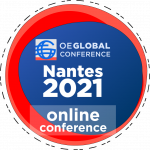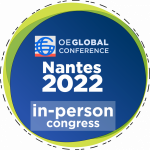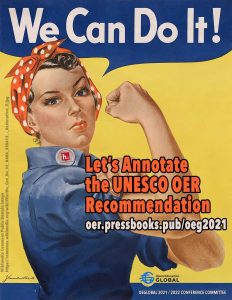Why We Are Annotating
 This book was created in conjunction with the Open Educational Global 2021 Conference themed around the implementation of the UNESCO Recommendation on Open Educational Resources (OER).
This book was created in conjunction with the Open Educational Global 2021 Conference themed around the implementation of the UNESCO Recommendation on Open Educational Resources (OER).
Our aim here is to engage the global open education community in becoming familiar with the Recommendation on OER, and enrich it by annotating notes to specific parts of the five action areas of the Recommendation. It provides everyone with an opportunity to position their own open education work within the context of the Recommendation and to learn from the work of others. Annotations supplement the UNESCO OER Recommendation with practical advice from the field adding valuable lessons learned and insights.
 The process of annotation will create a focused, curated dialogue around the Recommendation and build community as annotators publish, read, and comment on each other’s annotations. Ultimately, the annotation activity aims to engage the entire global open education community in helping each other implement and advance the UNESCO OER Recommendation. The notes you add here will be curated and synthesized during activities at the May 2022 Congress in Nantes, France.
The process of annotation will create a focused, curated dialogue around the Recommendation and build community as annotators publish, read, and comment on each other’s annotations. Ultimately, the annotation activity aims to engage the entire global open education community in helping each other implement and advance the UNESCO OER Recommendation. The notes you add here will be curated and synthesized during activities at the May 2022 Congress in Nantes, France.
Authors of annotations highlight and link their annotation to relevant text in the Recommendation. Practical annotations are invited to identify:
- Models, frameworks and other strategies that support adoption and use of OER
- Existing OER resources, policies, practices, and pedagogies
- Tools, technologies, and infrastructure that supports OER development, distribution, and stewardship
- Research and reports on open education impacts
- Communities and professional development related to OER
- Global organizations that support adoption and implementation of OER
- Sessions that took place during the OEGlobal online conference (and other open education conferences)
Commentary and analysis annotations are invited to:
- Identify needs associated with implementing the Recommendation
- Describe challenges and how to overcome them
- Summarize state of the art in a particular part of the world
- Explore the ways in which implementation of OER differs around the world
- Unpack OER for K-12 vs OER for higher education or lifelong learning
- Suggest new ideas and approaches not documented in the Recommendation
In preparation for this, all six language versions of the UNESCO Recommendation on OER (openly licensed Creative Commons CC BY-SA as per UNESCO’s open access policy) have been imported into this Pressbook where the Hypothesis functionality is automatically available.
How to Participate

This is an open and public project available to anyone, and itself is an OER (all annotations are by default licensed Creative Commons CC0).
Annotate With Us
- If you are familiar annotating with Hypothesis, select a language version of the Recommendation and annotate anywhere.
- Review a rationale and background on the concept of Annotation.
- Learn more about and practice annotating with Hypothesis.
- Read about the two OEGlobal Conferences and how they will advance the understanding and application of the Recommendation on OER.
- Explore the tools and resources to locate relevant content surfaced at the Online Conference that might be suitable for annotating.
- Review the Rapporteur Reports that synthesized conference activities.
